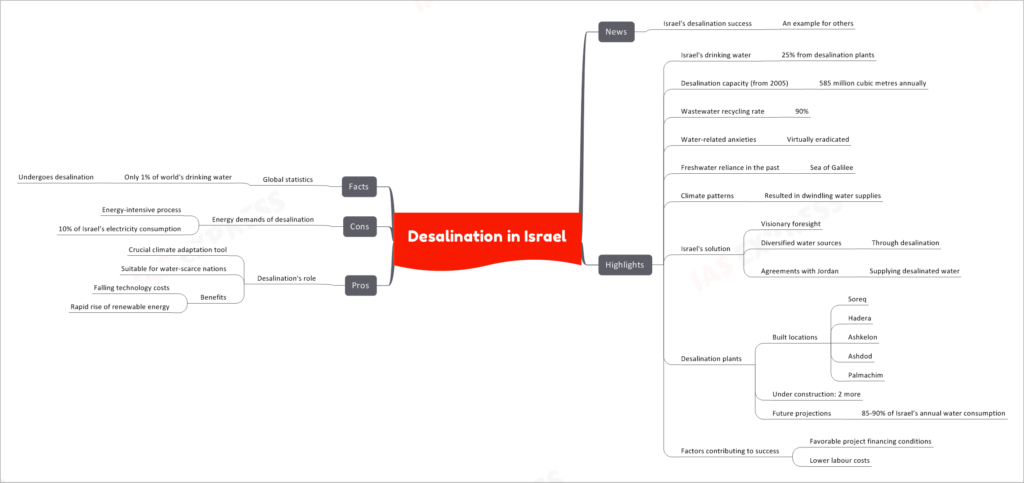Desalination in Israel

Israel’s remarkable success in desalination has positioned it as a global example, demonstrating the transformative potential of this technology in addressing water scarcity and ensuring sustainable water resources. Israel’s strategic approach to water management through desalination stands as a model for other nations facing similar challenges.
This topic of “Desalination in Israel” is important from the perspective of the UPSC IAS Examination, which falls under General Studies Portion.
Israel’s Desalination Success: A Blueprint for Others
Achieving Water Security
Israel’s journey towards water security has been anchored by its innovative approach to desalination. Approximately 25% of the nation’s drinking water is now sourced from desalination plants, a remarkable feat that serves as an inspiring example for other water-scarce regions.
Desalination Capacity and Wastewater Recycling
Since 2005, Israel has built a desalination capacity of 585 million cubic meters annually, reducing its reliance on freshwater sources like the Sea of Galilee. Moreover, the nation’s wastewater recycling rate has reached an impressive 90%, underscoring its commitment to sustainable water management.
Addressing Water-Related Anxieties
Israel’s past reliance on freshwater sources, coupled with changing climate patterns that led to dwindling water supplies, created significant water-related anxieties. However, Israel’s visionary foresight in diversifying its water sources through desalination has virtually eradicated these concerns.
Israel’s Desalination Journey: From Vision to Reality
Strategic Diversification and International Agreements
In response to water scarcity challenges, Israel pursued a strategic approach to diversify its water sources through desalination. Additionally, the nation entered agreements with Jordan, supplying desalinated water and fostering regional cooperation.
Desalination Plant Network
Israel’s desalination efforts are embodied in its network of desalination plants, including locations such as Soreq, Hadera, Ashkelon, Ashdod, and Palmachim. With two more plants under construction, Israel’s visionary approach is projected to meet 85-90% of its annual water consumption.
Factors Fueling Israel’s Desalination Success
Favorable Conditions and Project Financing
Israel’s desalination achievements are attributed, in part, to favorable project financing conditions and relatively lower labor costs, fostering a conducive environment for the implementation of these initiatives.
The Pros and Cons of Desalination
Crucial Climate Adaptation Tool
Desalination serves as a crucial tool for climate adaptation, offering a viable solution for water-scarce nations. Falling technology costs and the rapid rise of renewable energy further enhance the benefits of this approach.
Energy Intensity and Challenges
Despite its advantages, desalination is energy-intensive, consuming approximately 10% of Israel’s electricity. Balancing the energy demands of desalination with sustainability remains a challenge.
Facts and Global Context
Desalination on a Global Scale
Globally, only 1% of the world’s drinking water undergoes desalination, highlighting the vast untapped potential of this technology in addressing water scarcity challenges.

